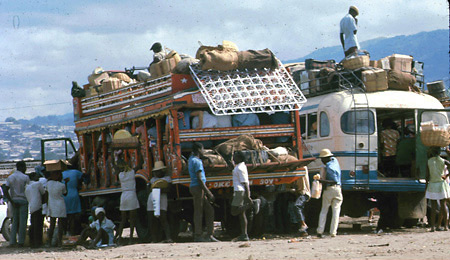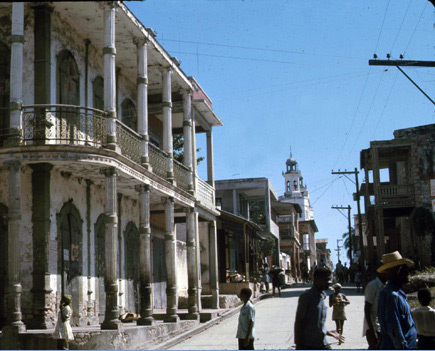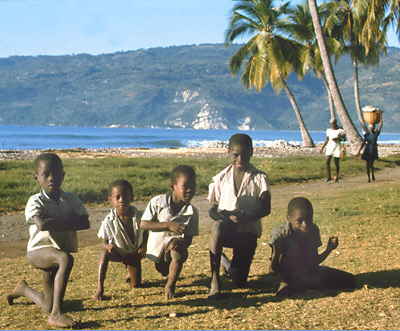 Haitians turned a truck into a public bus, which they crammed with passengers both inside and on the roof, which is where Bill and Diana rode. Freight was included: they shared the rooftop with turtles, ducks and bedsprings. Grand Central Station of Port Au prince was a muddy dirt field with an easy-going, jovial and communal atmosphere, decorated by the beautiful paintings on the sides of the buses.
After a
few days in Port au Prince, we decided to take the rugged
journey through the jungle and down to the south coast
of Haiti to Jacmel, a colorful beach town and former haven
for pirates.
The “bus station” was a vast open field
with dozens of trucks brightly decorated with paintings
in the “primitivist style.” We slogged around to a dozen
drivers and asked in French, “Where is this bus going?”
The trucks were all open-air with solid roof-tops where
overflow cargo and passengers could be loaded.
The nine-hour drive for ninety miles was
the most exciting and most unpleasant trip by public bus
that I have ever taken. This dirt road, or rather, dirt
track, cut through thick jungle over large rocks and through
huge potholes. The truck was so heavily packed with passengers
that, at one stop, Diana and I decided to climb up onto
the roof for the rest of the trip. We sat on the roof
crammed between other passengers as well as cages of ducks
and chickens.
 The main street of Jacmel, Haiti boasted French colonial architecture and
a history that included being a pirate's nest for about a century. The history remains, but last year's devastating earthquake changed the town, and travelers must visit New Orleans, Hanoi, Martinique or other French colonial towns to see such architecture. Diana and I both like traveling third class
in the third world because you have to keep alert all
the time. It makes me feel really alive! Riding on the
roof of a jolting truck, a person could be thrown off
and be injured or even killed. But what an exhilarating
feeling to be hanging onto a roof rack and brushing against
tree branches where I could reach out and touch grapefruits.
This was the feeling of pure freedom! This was the feeling
of being really alive!
On that dirt road between Port au Prince
and Jacmel there were no bridges at all, so the “bus”
had to drive across rivers many times, perhaps eighty
times. In one place we drove down a bank and into the
river, turned downstream and drove right down the middle
of the riverbed for a hundred yards, up another bank and
back onto the jungle road.
It was a great relief to finally drive out
of the jungle and into the French colonial town of Jacmel.
The town stands on sandy beaches of the Caribbean coastline,
but its buildings were decaying in the tropical humidity.
It was startling to discover a remnant of the French colonial
empire here in the West Indies. The 18th and 19th century
buildings were elegant with wrought iron balconies that
made Jacmel look like other French colonial towns around
the world: Algiers, Dakar, Saigon and Phnom Penh, Cayenne
and Devil’s Island, the French Quarter in New Orleans.
 On the beach, typical Haitian boys were having a good time in the eternal summer of the Caribbean. After the wild ride through the jungle we
could now kick back and enjoy swimming on the gold sand
beaches. Christmas morning held a startling surprise for
us: we got out of bed, strolled to the beach and found
the body of a dead man lying on the sand. A reminder that
we were in the third world. But now we had several days
to explore the elegant old town of Jacmel, an 18th century
outpost of the French Empire as well as a major nest of
Caribbean pirates.
This time the Tom Sawyer spirit had drawn
me into adventures in French-flavored towns and jungles
in the West Indies.
December 1974 |
